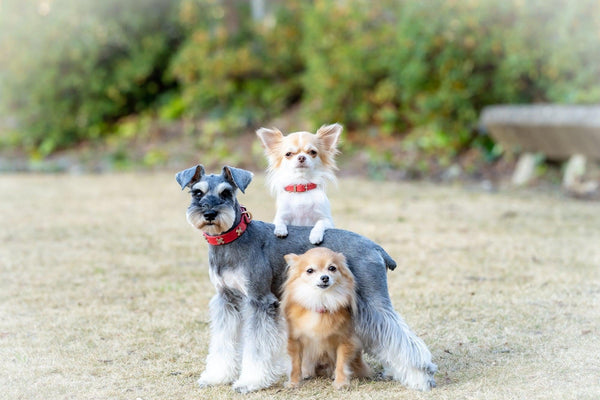
Jump to:
Walking through the streets of any Japanese city or town, visible among the many people that one will encounter on the street is another Japanese favorite icon: The dog.
Dogs are immensely popular in Japan, from the Shiba Inu and Akita breeds (which are seen in the eyes of many dog enthusiasts in the west as being inextricably linked to Japan) to other breeds such as terriers, toy poodles and many other “kawaii” (cute) canine friends.
What makes dogs in Japan popular? Is having a dog in Japan a similar experience to having a dog in the US or other Western countries? What's the history of dogs in Japan, and where & how did some of these Japanese dog breeds originate?
These are just some of the questions we'll explore in this article, as we delve into the cultural significance and experience of dogs in Japan. Join us as we navigate the Japanese dog’s journey, having transitioned from working companions to revered family members and, dare we say, an expression and reflection of one’s individual personality.
A History Of Dog Breeds In Japan

Not merely pets, dogs in Japan are esteemed family members, guardians of ancient wisdom and companions whose loyalty transcends generations.
To better understand the essence of Japanese dogs, let’s go for a walk through history to trace the roots of these loyal companions.
In ancient Japan, dogs were pragmatic allies in hunting and guarding. Thus it makes sense that the dog breeds that are more skillful or adept in these areas would have become more popular.
Dogs have also been revered for their spiritual significance. Buddhism and Shintoism have played pivotal roles in shaping the perception of animals in Japan, instilling a deep respect for all living beings.
A visit to a Shinto shrine in Japan, for example, will reveal statues of dogs or lion-dogs, called the “komainu.” These mythical lion-dog figures are said to be Guardian dogs, watching over the shrine and its patrons to foster a safe and serene environment of continuous worship and prayer.
As Japan transitioned through different eras, so too did the roles of dogs. Initially, they were valued for their utilitarian functions, such as aiding in hunting or guarding properties. Over time, a shift occurred, and dogs found a place within the hearts of families. Dogs have always been seen as embodying qualities of loyalty, fidelity and unconditional love.
The historical journey of Japanese dogs reveals not only the pragmatic aspects of their existence but also their symbolic importance in folklore and art. Dogs are often depicted as loyal guardians in traditional stories, embodying virtues that resonate deeply with the cultural fabric of Japan.
This historical overview of dogs in Japan gives us context for a closer examination of the various Japanese dog breeds that have become synonymous with the country's identity.
Authentic Japanese Dog Breeds: Shiba Inu, Akita, Hokkaido & Japanese Terrier
Among the breeds of dogs that are seen as being “Japanese,” four in particular stand out.
Two Japanese dog breeds are very widely known around the world: The Shiba Inu and the Akita. The Hokkaido dog and Japanese Terrier are also mainstay Japanese dog breeds. Let's take a closer look at each of these breeds.
Shiba Inu: Simultaneously Stoic & Cute

At the forefront of authentic Japanese dog breeds stands the Shiba Inu, a small and spirited canine with a fox-like appearance.
Known for their independent nature and keen intelligence, Shiba Inu (also referred to as “Shiba Ken” in Japanese) have captured the hearts of dog enthusiasts worldwide. Originating from Japan's mountainous regions, these agile and alert dogs were initially bred for hunting small game, showcasing both charm and utility.
The Shiba Inu's distinctive appearance, marked by a curled tail and a plush double coat, contributes to its widespread popularity. Beyond their physical attributes, Shiba Inu exhibit a bold and confident demeanor, making them suitable companions for those who appreciate a spirited yet loyal presence in their homes.
From a cultural standpoint, we would assert that the Shiba Inu is distinctly Japanese in its personality and appearance. In fact, Shiba Inu is a rather stoic dog. While some people might see the Shiba Inu as being shy or reserved, in fact they are fiercely loyal to their owners while appearing contemplative in their nature.
In Japanese, a commonly uttered phrase is “Shiba kyori,” referring to the distance that the Shiba Inu often keeps between itself and its owner as they walk or even sit. But it’s best not to mistake this distance for a kind of standoffishness or marked shyness. Although the Shiba Inu breed might not be seen as distinctly affectionate, it maintains a “kawaii” nature and a hearty respect in Japanese culture. That's because of the unwavering loyalty the Shiba Inu tends to have for its people or pack.
The Shiba Inu, therefore, is the ideal companion dog in Japan, both for single people and for couples or families. It is a highly revered dog breed that is the most popular dog in Japan, and in fact the Shiba in a breed has attained a global popularity status that continues to adapt and evolve around the world.
Akita: Japanese Dog Breed & Icon of Loyalty & Courage

Emerging from the rugged mountains of northern Japan, the Akita dog breed is an embodiment of loyalty, courage and unwavering devotion.
Renowned for their noble stature and dignified demeanor, Akitas have captivated hearts and inspired admiration for centuries. Their distinctive white coats, adorned with shades of black or brindle, add to their regal presence, making them a stalwart among Japanese dog breeds.
Akitas trace their lineage to ancient hunting dogs, a heritage evident in their athletic build and powerful musculature. Their compact bodies, dense fur and curled tails are well adapted for traversing the harsh terrain of their ancestral lands. Despite their imposing size, Akitas are surprisingly agile and possess remarkable stamina, making them formidable companions for hunting and exploration.
The Akita is a breed of contrasts, balancing its formidable exterior with a gentle and affectionate nature. Beneath their stern gaze lies a loyal and devoted heart, forming unbreakable bonds with their families. They are especially protective of children, earning them the well-deserved title of "gentle giants."
Akitas are not for the faint of heart. Their independent spirit and strong-willed personality demand a confident and experienced owner. Early socialization and consistent training are essential to ensure their well-being and harmonious integration into the family home. However, for those willing to invest the time and effort, Akitas reward their owners with devoted loyalty, unwavering companionship and a unique bond.
The Hokkaido

Venture northward in the Japanese archipelago, and you will arrive at the northernmost island of Hokkaido. Known for cold temperatures and vast open spaces (and great food, we might add), this region is also said to be the origin point of the Hokkaido dog.
The Hokkaido is a robust and dignified breed. Renowned for their strength and endurance, these medium-sized dogs have historically been valued for their versatility in hunting large game, such as bears and deer.
The Hokkaido’s thick double coat, erect ears and curled tail equip them to endure harsh climates, reflecting their resilience and adaptability.
Known for their loyalty and gentle disposition, Hokkaido dogs make excellent family companions. Their strong sense of loyalty and protective instincts make them particularly well-suited for those seeking a steadfast and dependable canine friend.
Japanese Terrier

On the smaller end of the canine spectrum, we encounter the Japanese Terrier, a charming and compact breed with a distinctive short coat and expressive eyes.
Originally bred for vermin control, Japanese Terriers have evolved into delightful household companions known for their friendly and affectionate nature.
Despite their modest size, Japanese Terriers are spirited and energetic, making them well-suited for families with an active lifestyle. Their adaptability and sociable disposition contribute to their growing popularity both in Japan and beyond.
Akita Inu vs Shiba Inu

For those contemplating bringing a Japanese breed into their home, the choice between the Akita Inu and Shiba Inu is a decision worthy of some time and research.
The Akita Inu, a larger and more imposing breed, contrasts with the smaller yet spirited Shiba Inu. While both breeds share certain characteristics, such as loyalty and intelligence, their differences in size, temperament and care requirements cater to distinct preferences and lifestyles.
The Akita Inu, known for its dignified and noble presence, has a storied history as a symbol of good health, happiness and long life in Japanese culture. In contrast, the Shiba Inu's playful and agile nature often appeals to those seeking a more compact yet spirited companion. Understanding these nuances allows prospective dog owners to make an informed decision, ensuring a harmonious match between the chosen breed and their lifestyle.
Stay tuned as we continue our exploration into the realm of Japanese dogs, delving deeper into breeds to consider and those to approach with caution in the unique setting of Japan.
Dog Breeds To Consider & Avoid In Japan

While Japan is a welcoming country for dogs of various breeds, there are practical considerations for those contemplating bringing their furry friends to this island nation.
Having a dog in Japan is not exactly the same as having a dog in the US or in other countries. First off, most Japanese cities are very densely populated in comparison to Western cities, meaning that dog owners face distinct challenges.
Aside from the aforementioned Japanese dog breeds, many Japanese owners have chosen to adopt small dog breeds. This fits well with living in compact spaces in densely populated areas.
Many of these dog breeds are the same as you would see in the west, for example, the toy poodle, the terrier and certain varieties of hounds such as beagles. Small to medium sized dog breeds are the most visible in Japanese parks, sidewalks and neighborhoods. Every now and then, though, you might also encounter a dog breed that is more in the medium to large size range, such as a German Shepherd or a husky.
The compact urban landscapes, cultural norms and specific regulations may pose challenges for certain breeds. Larger dogs, particularly those with high energy levels, might find the tight living spaces and limited outdoor areas less accommodating.
Breeds that may face challenges adapting to the Japanese environment include those requiring substantial exercise and space. Breeds with strong herding instincts, such as Border Collies, may find the city life constraining. Similarly, giant breeds like Great Danes or Saint Bernards might face difficulty in navigating the smaller living spaces commonly found in Japanese homes.
However, this doesn't mean that larger breeds are entirely incompatible with life in Japan. With proper training, socialization, and dedication to meeting their exercise needs, many larger breeds can thrive in a Japanese setting.
It's essential for potential dog owners to thoroughly research and consider the unique demands of their chosen breed before making the move to Japan or getting a dog while living in Japan.
Life As A Dog Owner/Parent/Friend In Japan

Dog owners in Japan shower their furry friends with an abundance of love and care, often going above and beyond to ensure their well-being and comfort. This deep-rooted affection manifests in various ways, from elaborate dressing to stroller outings, showcasing the unique relationship between Japanese dog owners and their beloved pets.
One of the most striking aspects of Japanese dog ownership is the practice of dressing dogs in human-like clothing. From stylish sweaters and raincoats to festive kimono and cool t-shirts, many Japanese adorn their dogs with an array of canine couture. These outfits not only add a touch of whimsy and personality to their furry friends but also serve to protect the dog from the elements.
Another distinguishing feature of Japanese dog ownership is the prevalence of strollers. Unlike in many Western countries, where dog strollers are often seen as a novelty, strollers have become a ubiquitous sight in Japanese cities.
But don't worry, dogs in Japan get plenty of exercise; the stroller is often used to transport the dog from home to a safer and more open place where the dog can get in a good walk or run. Human companions use strollers to transport their precious pups in comfort and style. This practice stems from the desire to protect dogs from the harsh weather conditions and busy streets, ensuring their safety and well-being during walks and outings.
These practices, while unique to Japan, reflect a deep-rooted respect for animals and a commitment to their well-being. Japanese dog owners view their canine companions not merely as pets but as cherished members of the family, deserving of the same care and attention as their human counterparts.
Popular Japanese Dog Names And Meanings

In Japan, the art of naming extends beyond mere identification; it is a reflection of cultural values, aspirations and even superstitions.
When choosing a name for your Japanese canine companion, consider not only its phonetic appeal but also its cultural resonance.
Here are some popular Japanese dog names along with their meanings:
Hana (花): Meaning "flower," Hana is a delicate and elegant name suitable for a graceful female dog.
Yuki (雪): This name, meaning "snow," is perfect for a white-furred canine companion or fluffy dog breed.
Kumo (雲): Also for a fluffy dog breed, Kumo, meaning "cloud," evokes a sense of softness and lightness.
Sakura (桜): Symbolizing cherry blossoms, Sakura is a popular name that captures the fleeting beauty of nature.
Katsu (勝): Meaning "victory," Katsu is a powerful and motivating name for a dog with a bold spirit.
Other popular Japanese dog names include Taro, Runa, Maron, Taiyo and Sora, among many others.
Choosing a name that resonates with both the cultural significance of Japan and the unique qualities of your dog creates a deeper connection and enriches the shared bond.
Japanese Dog Breeds And Dog Life In Japan

Whether you are a dog enthusiast, a Japanophile or someone considering adding a Japanese breed to your family, the diverse array of authentic Japanese dog breeds offers something for everyone.
From the spirited Shiba Inu and stalwart Akita to the resilient Hokkaido and more, each breed brings its own charm and character to the tapestry of canine companionship.
Do you have a Japanese breed of a furry friend in your family? Do you have a Japanese name for your dog? Let us know in the comments below!


0 comments